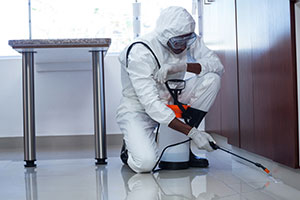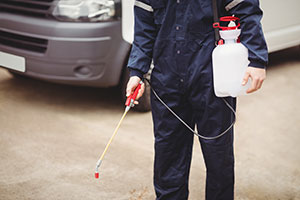
DIY Pest Control: Effective Home Remedies and When to Call the Pros
You're not alone in your battle against pesky intruders! This guide is your secret weapon to reclaim your home from common pests.
With natural home remedies, you'll be tackling ants, rodents, and other critters like a pro.
And when the going gets tough, we'll show you when it's time to call in the real pros.
Get ready to roll up your sleeves and let's get those pests packing!
Understanding Common Household Pests
Before you can effectively combat them, you'll need to understand the five most common household pests that might invade your space. It's like being part of a community watch - only, instead of keeping an eye out for unusual human activity, you're looking for signs of unwanted critters.
First up are cockroaches. They're one of the most dreaded pests, and for good reason. Not only are they unsightly, but they can also spread diseases. Look for droppings or a musty smell, which are telltale signs of a roach infestation.
Next, we've rodents. Rats and mice can cause serious damage to your home and are also carriers of disease. You'll know they're around if you find droppings, chewed wires, or hear scurrying noises in your walls.
Thirdly, there's the common house fly. While not as damaging as roaches or rodents, they're incredibly annoying and can contaminate food. Keep an eye out for clusters of small, dark spots - those are fly specks.
Bed bugs are the fourth pest. They're notoriously hard to get rid of and can cause itchy, painful bites. Look for tiny blood spots on your sheets as a sign of their presence.
Finally, ants are a common nuisance. While usually harmless, they can become a problem if they find a food source in your home. Be aware of trails of ants, particularly in your kitchen or pantry.
Understanding these pests is your first step in keeping your home safe and comfortable. Remember, we're all in this together, and a pest-free home is a happy home.
Home Remedies for Ant Control
Now, let's dive into several effective home remedies you can use to keep those pesky ants at bay. You're not alone in this battle; many homeowners face the same challenge. Let's arm ourselves with knowledge and tackle this issue head-on together.
First up, vinegar. Ants hate the smell of vinegar. So, mix equal parts of white vinegar and water in a spray bottle and spray it around your home where you've spotted the ants. This not only deters the ants but also wipes out the scent trails they leave for other ants to follow.
Next, cinnamon. This pantry staple isn't just for your favorite recipes. Ants detest its strong aroma, too. Sprinkle ground cinnamon or spray cinnamon essential oil around entry points and known ant trails.
The citrus peels you usually throw away can also be an ally. Ants dislike their scent, so scatter crushed peels around areas of ant activity. Additionally, consider using coffee grounds. Sprinkle used coffee grounds around your home's exterior to ward off ants.
And if all else fails, it's time to bring out the big guns - borax. Mix equal parts of borax and food bait (like sugar), place it near the ant trails. The ants will be attracted to the sugar, take the borax back to their colony, causing a decline in their population.
Natural Solutions for Rodent Problems
Let's move on to addressing a common nuisance in many households - rodents, and explore a few natural remedies that you can use to keep these unwanted guests at bay. We understand how unsettling it can be to find a rodent lurking in your space. It's not just about the scare factor - rodents can also carry diseases and cause considerable damage to your home. However, you're not alone in this and we're here to guide you through some effective natural solutions.
Here are a couple of DIY solutions that you might want to try:
Peppermint Oil: Not just a refreshing scent for you, but a major turn off for rodents. They detest the smell of peppermint.
- Soak cotton balls in peppermint oil and place them in areas where you've noticed rodent activity.
- Remember to replace the cotton balls every few days for the best results.
Seal Entry Points: Prevention is always better than cure, and in this case, it's about making your home less welcoming for these pests.
- Check your home for cracks and holes, especially in dark and secluded areas.
- Use steel wool to fill these gaps as rodents can't chew through it.
DIY Methods for Insect Management
While rodents can be a real headache, you shouldn't overlook the smaller pests either - insects, which can be just as troublesome if not more. As part of our DIY pest control community, you'll find that managing insects at home isn't as daunting as it seems.
First, let's talk about prevention. You can keep insects at bay by maintaining a clean home. Regularly take out the trash, keep food sealed and stored, and don't let dirty dishes pile up. These simple routines can significantly reduce the attraction for insects.
Next, let's consider some natural repellents. Certain plants, such as basil and lavender, are known to deter insects. Planting these around your home can create a natural barrier against unwanted critters. Essential oils, like peppermint or lemongrass, can also be used. Mix a few drops with water in a spray bottle and use it around areas where you've seen insects.
In some cases, you might need more than prevention and natural repellents. Here's where DIY traps come in. For instance, a simple mixture of sugar, yeast, and water in a bottle can trap and eliminate fruit flies.
Remember, these DIY methods aren't instant fixes, but they can effectively reduce and manage insect populations over time. With patience and consistency, you'll soon reclaim your home from these tiny invaders.
However, if the infestation becomes too overwhelming, don't hesitate to call in the pros. You're part of a community that understands the challenges of pest control, and there's no shame in seeking professional help when needed.
Identifying Pest Infestations
In spite of your best efforts, if you're still seeing signs of pests, it's crucial to quickly identify the type of infestation you're dealing with. We're in this together, and knowing is half the battle. Recognizing the signs early can save you time, money, and a lot of stress.
Let's break it down. Generally, there are two main types of infestations you might encounter: insect invasions and rodent problems. Here's how you can spot them:
Insect Invasion
- Look for physical signs of insects, such as seeing the bugs themselves or finding their droppings.
- You might also notice damage to your home, like chewed wires or woodwork.
Rodent Problems
- Listen for sounds of scurrying or squeaking in the walls, especially at night.
- Watch for gnawed food packages or rodent droppings.
If you're unsure, don't worry. It's okay to call in the pros for an accurate identification and treatment plan. They're part of our community and are always ready to lend a hand.
When DIY Pest Control Fails
Even after trying all the DIY pest control methods, there's a chance you might still find pests lurking around your home. It's frustrating, we know. You've put in the time, effort, and even braved those creepy crawlies, yet they persist. But don't worry, you're not alone in this battle. Many homeowners face the same problems, and it's completely okay.
The reality is, some infestations are too stubborn or extensive for DIY methods. Certain pests, like termites or bed bugs, are particularly tough to eradicate completely on your own. They're sneaky, resilient, and multiply rapidly. If you've tried everything in your power and still see signs of pest activity, it's time to call in the professionals.
Professional pest controllers have the experience and knowledge to handle stubborn infestations. They can identify the specific species invading your home, understand their behavior, and know exactly how to eliminate them. Moreover, they've access to specialized tools and products that are more powerful and targeted than general store-bought solutions.
There's no shame in admitting that you need help. In fact, it's a smart move to recognize when the situation is beyond your control. You're part of a community of homeowners who care about maintaining a safe, comfortable living environment. Remember, calling in the pros isn't a defeat; it's taking the next step towards a pest-free home.
Pest control is a team effort, and sometimes, the best move is to pass the baton to those trained for the task. When DIY fails, don't despair. You're not alone, and help is always available.
Hiring Professional Pest Controllers
So, you've decided it's time to bring in the experts, and that's a smart move! You've realized that, sometimes, home remedies just aren't enough to combat those pesky pests. The professionals have the proper tools, substances, and know-how to effectively and safely eliminate your problem. You're becoming part of a community that values the health and wellbeing of their homes and families.
Hiring the right pest control company is crucial. You want to ensure they've a reputable history and proven track record. Don't rush into a decision. Take the time to research and compare your options.
Here are some key factors to consider:
- Their Experience and Expertise
- How long have they been in business?
- What types of pests do they specialize in?
- Their Service Plan
- Do they provide a comprehensive pest control plan?
- Is their service guaranteed?
You're not alone in this journey. Remember, many others have faced and successfully dealt with pest problems. You're joining a group of savvy homeowners who know when to roll up their sleeves for some DIY, and when to call in professional reinforcements.
It's OK to admit that you need help. That's why pros exist, after all. So, breathe easy. You're making a good choice, a choice that shows you care about your home and those who live in it. You're choosing safety, effectiveness, and peace of mind. Welcome to the club of smart homeowners. You're in good company.
Key Takeaways
- DIY pest control methods can be effective for managing common household pests like ants, rodents, and insects.
- Home remedies such as vinegar, cinnamon, citrus peels, and coffee grounds can help deter ants and insects.
- Peppermint oil, sealing entry points, keeping a clean home, and planting basil and lavender can help with rodent problems.
- If DIY methods fail or if dealing with stubborn or extensive infestations, it is important to call in professional pest control experts for their specialized tools, knowledge, and targeted solutions.




